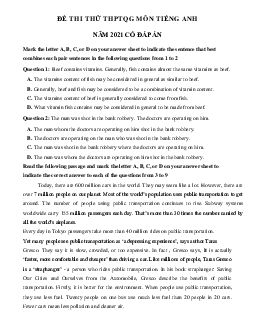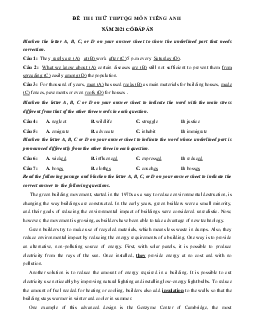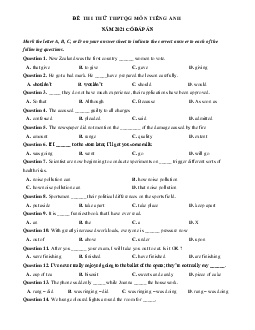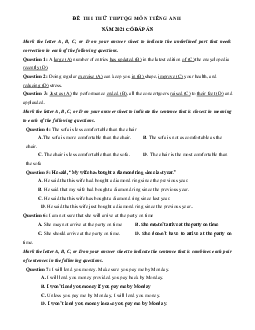










Preview text:
ĐỀ THI THỬ THPTQG MÔN TIẾNG ANH
NĂM 2021 CÓ ĐÁP ÁN
Mark the letter A, B, C, or D on your answer sheet to indicate the word(s) CLOSEST in meaning
to the underlined word(s) in each of the following questions.
Question 1: Lack of water and nutrients has impeded the growth of these plants. A. promoted B. assisted C. realized D prevented
Question 2: Few businesses are flourishing in the present economic climate. A. taking off B. setting up C. growing well. D. closing down
Mark the letter A, B, C, or D on your answer sheet to indicate the word(s) OPPOSITE in meaning
to the underlined word(s) in each of the following questions.
Question 3: Many parents always kept a tight rein on their children. A. gave less money B let loose C. set free D. helped to ride
Question 4: The Red Cross is an international humanitarian agency dedicated to reducing the
sufferings of wounded soldiers, civilians and prisoners of war. A happiness B. loss C. sadness D. pain and sorrow
Mark the letter A, B, C, or D on your answer sheet to indicate the correct answer to each of the following questions.
Question 5: We got lost, so we had to stop .............. for directions A. to ask B. ask C. asking D. to be asked
Question 6: Two people are reported .............. in an earthquake yesterday. A. to be injured B. being injured C. to have been injured D. having been injured
Question 7: When we came last night, they .............. dinner with their family. A. was having B. have C. are having D. were having
Question 8: Henry doesn't like fish, and ............... A. so does Tom B. Tom doesn't, neither C. neither does Tom D. Tom does, too
Question 9: After three days' taking medication, Mary .............. over her flu. A. turn B. come C. get D. look
Question 10: The plague, otherwise known as the Black Death, was a .............. disease. A contagious. B. contiguous C. contingent D. congenial
Question 11: The human brain .............. only two percent of an adult's body weight. A. which makes up B. it makes up C. makes it up D. makes up
Question 12: He was .............. from the competition for using drugs. A. disqualified B. omitted C. sacked D. prevented
Question 13: Your sister hardly talks to anyone, .............._? A. does she B. is she C. doesn't she D. isn't she
Question 14: .............._ up late last night, she wouldn't be sick now. A. If she didn't stay B. Were she to stay C. Had she not stayed D. Unless she stayed
Question 15: Women seem to be easily terrified .............._ small insects such as spiders, cockroaches. A. for B. about C. with D. of
Question 16: The cyclists are warned about the lane full of .............. and turns. A. toss B. tears C. twists D. tucks
Question 17: The conflict between the two countries should be settled by .............. means, not lighting. A. diplomacy B. diplomatic C. diplomatically D. diplomat
Question 18: Elephants scratch themselves with a stick ............... A. which hold in their trunks B. are held in their trunks C. holding in their trunks D. held in their trunks
Question 19: Henry looks so frightened and upset. He .............. something terrible. A. should have experienced B. must have experienced C. needn't have experienced D. can have experienced
Mark the letter A, B, C, or D on your answer sheet to indicate the sentence that best completes
each of the following exchanges. Question 20:
- Peter: "Might I have more bread?" - Mary:"..............” A. It's my pleasure. B. Not at all. I'll do it. C. Please, help yourself.
D. Yes, that's very kind of you. Question 21:
- Laura: "It's a lovely party. Thanks a lot!"
- Maria: “.............._”
A. No, not very. What a pity! B. It's a pleasure. I'm glad you like it.
C. Thank you for your help. D. What a nice surprise. Thanks.
Mark the letter A, B, C, or D on your answer sheet to indicate the word which differs from the
other three in the position of the main stress in each of the following questions. Question 22: A. comfortable B. powerful C. accurate D. opinion Question 23: A. improvement B. communicate C. occasional D. reservation
Mark the letter A, B, C, or D on your answer sheet to indicate the word whose underlined part
differs from the other three in pronunciation in each of the following questions.
Question 24: A. challenge B. achievement C. chance D. scholarship
Question 25: A. soldier B. leader C. adopt D. wonder
Read the following passage and mark the letter A, B, C, or D on your answer sheet to indicate the
correct word or phrase that best fits each of the numbered blanks from 26 to 30.
Acupuncture is a Chinese method of (26) .............. illnesses by inserting needles into certain points of
the body. The idea is that this restores the natural balance of energy, which is disturbed when a person
is ill. The origins of this therapy have been traced (27) .............. over five thousand year, but it only
began to be accepted in the West' the 1970s.
In 1971, James Reston, a well-known journalist from the New York Times, was visiting China when he
developed appendicitis. He was operated on in a hospital in Peking, where the doctors used acupuncture
to (28) .............. his pain. Reston was surprised at how effective it was, and wrote about it in an article for the newspaper.
Soon afterwards, Chairman Mao Tse-tung invited a group of (29) .............. Western doctors over to
China to witness for themselves that acupuncture worked. They were accompanied by television crews,
and soon viewers in the West were watching operations being carried out on patients with acupuncture
needle sticking out of them. The patients felt (30) .............. pain. The Western experts were a little
embarrassed at what they saw, because they had previously ridiculed idea that patients could be treated
with needles. Now they had to admit that acupuncture actually worked. Question 26: A. improving B. doctoring C. practicing D treating Question 27: A back B. forward C. up D. towards Question 28: A. release B. repair C. relieve D. retain Question 29: A. distinguished B. impressive C. distinct D. related Question 30: A. not B. any C. no D. none
Mark the letter A, B, C, or D on your answer sheet to indicate the sentence that is closest in
meaning to the sentence given in each of the following questions
Question 31: You needn't have taken so many warm clothes there.
A. It's not necessary for you to take so many warm clothes there.
B. You have taken so many warm clothes there that I don't need.
C. There is no need for you to take so many warm clothes there.
D. You took lots of warm clothes there but it turned out not necessary.
Question 32: No sooner had she put the telephone down than her boss rang back.
A. As soon as her boss rang back, she put down the telephone.
B. Scarcely had she put the telephone down when her boss rang back.
C. Hardly she had hung up, she rang her boss immediately.
D. She had hardly put the telephone down without her boss rang back.
Question 33: Twice as many men as women are insurance agents.
A. More men than women have insurance.
B. Male insurance agents outnumber female agents.
C. Women are twice as likely as men to have insurance.
D. Insurance is twice as difficult to sell to women as to men.
Read the following passage and mark the letter A, B, C, or D on your answer sheet to indicate the
correct answer to each of the questions from 34 to 40
Crows are probably the most frequently met and easily identifiable members of the native fauna of the
United States. The great number of tales, legends, and myths about these bird indicates that people have
been exceptionally interested in them for a long time. On the other hand, when it comes to substantive-
particularly behavioral - information, crows are less well known than many comparably common
species and, for that matter, now a few uncommon ones: the endangered California condor, to cite one
obvious example. There are practical reasons for this.
Crows are notoriously poor and aggravating subjects for field research Keen observers and quick
learners, they are astute about the intentions of other creatures, including researchers, and adept at
avoiding them. Because they are so numerous, active, and monochromatic, it is difficult to distinguish
one crow from another. Bands, radio transmitters, or other identifying devices can be attached to the,
but this of course requires catching live crows, who are among the wariest and most untrappable of birds.
Technical difficulties aside, crow research is daunting because the ways of these birds are so complex
and various. As preeminent generalists, members of this species ingeniously exploit a great range of
habitats and resources, and they can quickly adjust to changes in their circumstances. Being so
educable, individual birds have markedly different interests and inclinations, strategies and scams. For
example, one pet crow learned how to let a dog out of its kennel by pulling the pin on the door. When
the dog escaped, the bird went into the kennel and ate its food.
Question 34: What does the passage mainly discuss?
A. The ways in which crows differ from other common birds
B. The myths and legends about crows
C. The characteristics that make crows difficult to study
D. The existing methods for investigating crow behavior
Question 35: According to the first paragraph, what evidence is there that crows have interested people for a long time?
A. The large number of stories about crows
B. The frequency with which crows are sighted
C. The amount of research that has been conducted on crows
D. The ease with which crows are identified
Question 36: The word "comparably" in paragraph 1 is closest in meaning to A. interestingly B. Similarly C. otherwise D. sometimes
Question 37: The word "them" in paragraph 2 refers to A. crows B. subjects C. intentions D. researchers
Question 38: According to the second paragraph, crows are poor subjects for field research for all of the following reasons EXCEPT:
A. They can successfully avoid observers.
B. They are hard to distinguish from one another.
C. They can be quite aggressive.
D. They are difficult to catch.
Question 39: According to the passage, the author implies that using radio transmitters would allow a
researcher who studies crows to A. identify individual crows.
B. follow flocks of crows over long distances.
C. record the times when crows are most active.
D. help crows that become sick or injured.
Question 40: The author mentions a pet crow to illustrate ...............
A. the clever ways that crows solve problems
B. the differences between pet crows and wild crows
C. the ease with which crows can be tamed
D. the affection that crows show to other creatures
Read the following passage and mark the letter A, B, C, or D on your answer sheet to indicate the
correct answer to each of the questions from 41 to 45
Another critical factor that plays a part in susceptibility to colds is age. A study done by the University
of Michigan School of Public Health revealed particulars that seem to hold true for the general
population. Infants are the most cold-ridden group, averaging more than six colds in their first year.
Boys have more colds than girls up to age three. After the age of three, girls are more susceptible than
boys, and teenage girls average three colds a year to boys' two.
The general incidence of colds continues to decline into maturity Elderly people who are in good health
have as few as one or two colds annually. One exception is found among people in their twenties,
especially women who show a rise in cold infections, because people in this age group are most likely
to have young children. Adults who delay having children until their thirties and forties experience the
same sudden increase in cold infections.
The study also found that economics plays an important role. As income increases, the frequency at
which colds are reported in the family decreases. Families with the lowest income suffer about a third
more colds than families at the highest end. Lower income in general forces people to live in more
cramped quarters than those typically occupied by wealthier people, and crowding increases the
opportunities for cold virus to travel from person to person. Low income may also adversely influence
diet. The degree to Which poor nutrition affects susceptibility to colds is not yet clearly established, but
an inadequate diet is suspected of lowering resistance in general.
Question 41: Which of the following is closest in meaning to the word "particulars” in the paragraph? A. Minor errors B. Specific facts C. Small distinctions D. Individual people
Question 42: According to the passage, which of the following groups of people is most likely to catch colds? A, Infant boys B. Young girls C. Teenage boys D. Elderly women
Question 43: The information in the second paragraph supports which of the following conclusions?
A. Men are more susceptible to colds than women
B. Children infect their parents with colds.
C. People who live in cold climate have more colds than those who live in a warm one.
D. People who don't have children are more susceptible to colds than those who do.
Question 44: The author's main purpose in writing the last paragraph is to
A. explain how cold viruses are transmitted.
B. prove that a poor diet causes colds.
C discuss the relationship between income and frequency of colds.
D. discuss the distribution of income among the people in the study.
Question 45: The author's tone in this passage could best be described as A. neutral and objective. B. humorous. C. tentative but interested. D. highly critical
Mark the letter A, B, C, or D on your answer sheet to indicate the underlined part that needs
correction in each of the following questions.
Question 46: Alike all other mammals, dolphins have lungs. A. Alike B. all other C. have D. lungs
Question 47: The books for my engineering course are much more expensive than my other courses. A. The B. much C. than D. other
Question 48: While verbalization is the most common form of language in existence, humans make use
of many others systems and techniques to express their thoughts and feelings. A. the most common form B. in existence C. others systems D. to express
Mark the letter A, B, C, or D on your answer sheet to indicate the sentence that best combines
each pair of sentences in the following questions
Question 49: The team leader allowed members to make important decisions. He fostered their spirit of commitment.
A. Allowing members to make important decisions, the team leader fostered their spirit of commitment
B. On behalf of the team, the leader made important decisions to foster their spirit of commitment.
C. Although the team leader wanted to foster the spirit of commitment among members, he made
important decisions on his own.
D. All members could make important decisions, so that the spirit of commitment would be discouraged.
Question 50: Nam defeated the former champion in three sets. He finally won the inter- school table tennis championship.
A. Being defeated by the former champion, Nam lost the chance to play the final game of inter-school table tennis championship.
B. Having defeated the former champion in the inter-school table tennis, Nam did not hold the title of champion.
C. Having defeated the former champion in three sets, Nam won the inter-school table tennis championship.
D. Although Nam defeated the former champion in three sets, he did not win the title of the inter-school table tennis champion. ĐÁP ÁN 1 D 11 D 21 B 31 D 41 B 2 C 12 A 22 D 32 B 42 A 3 C 13 A 23 D 33 B 43 B 4 B 14 C 24 D 34 C 44 B 5 A 15 D 25 A 35 A 45 A 6 C 16 C 26 D 36 B 46 A 7 D 17 B 27 A 37 D 47 C 8 C 18 D 28 C 38 C 48 C 9 C 19 B 29 A 39 A 49 A 10 A 20 C 30 C 40 A 50 C



